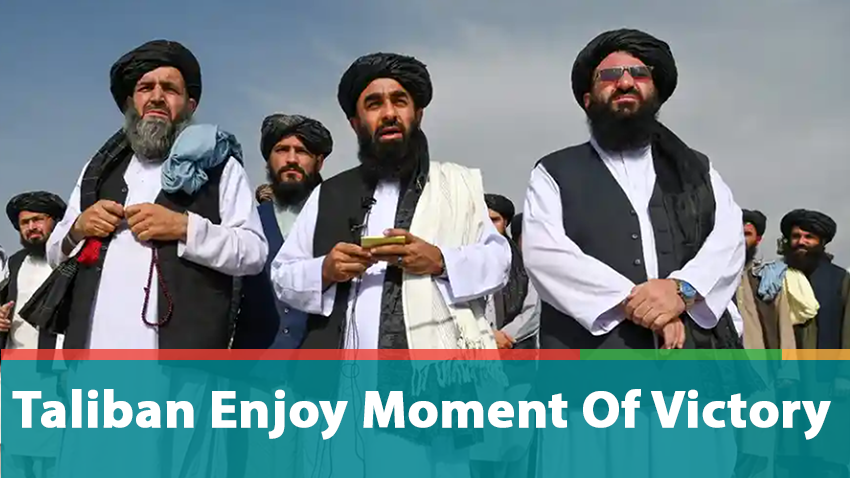
As guards dismantle barricades at airport, leadership holds talks on how the spoils of power will be shared
The Taliban marked the start of their first day in full control of Afghanistan with celebratory gunfire, minutes after the last US plane of soldiers and their ambassador lifted off from Kabul airport, sealing Washington’s humiliating defeat in its longest war.
Twenty years, tens of thousands of lives and trillions of dollars separated the arrival of the first US troops on Afghan soil after 9/11 and the Taliban’s triumphant restoration in the Afghan capital.
They now control more of the country than they did in the autumn of 2001, when a significant resistance movement still held swathes of the north. Their armed opposition is now largely pinned into Panjshir province, north of the capital.
“The world should have learned their lesson and this is the enjoyable moment of victory,” said the Taliban spokesman Zabihullah Mujahid in a livestreamed statement.
With the conquest complete, now they have to work out how to rule a country that is desperately poor, facing a crippling drought and has lost large numbers of its educated elite overnight. Doctors and civil servants risked their lives to flee because they were so terrified of Taliban rule.
Taliban commanders have acknowledged the challenge ahead, even secretly reaching out before they captured Kabul to ask some prominent Afghans to join a future government.
But on Tuesday the focus was on celebrating a campaign that humbled a superpower through persistence and attrition over two decades. As the oft-quoted Taliban maxim went, “you [Americans] have the watches but we have the time”.
A photo of the last US military officer stepping on to a plane, captured in a blurry green night-vision image, was soon paired on social media with a black and white shot of the last Russian soldier leaving in 1989, and a painting of a sole British military survivor riding down from Kabul in 1842.
“The graveyard of empires,” said one Taliban propagandist in a succinct tweet. As the gunshots rang out, Taliban forces flooded across the airport that for two weeks had been the last foreign foothold in Afghanistan, the dangerous, chaotic base for a mass evacuation.
Footage showed militants inspecting a hangar holding abandoned and disabled helicopters, identical to those used to ferry diplomats out of the embassy. Around a perimeter that had been besieged by people desperate to escape their new rulers, Taliban guards moved into place and began dismantling barricades.
“The last five aircraft have left, it’s over!” said Hemad Sherzad, a Taliban fighter stationed at Kabul’s international airport. “I cannot express my happiness in words. Our 20 years of sacrifice worked.”
The US had left basic equipment for the Taliban to run the airport, including two firetrucks and aircraft staircases, but international aviation maps showed the skies over Afghanistan were empty as pilots avoided an airspace that for now has no clear manager.
Both victors and defeated have said they are keen for commercial flights to restart. The US and its allies want to evacuate up to 200 citizens it says are still stuck on the ground and Afghans who supported their mission in the country but were not able to get into the airport.
The Taliban are keen to show they can get Afghanistan working again. With the evacuations over, international focus is shifting to who exactly will run the country and how.
The militants were apparently as surprised as their enemies at how fast Kabul crumbled, and had not prepared to take over government overnight. The flight into exile of the former president Ashraf Ghani swept away hopes for a negotiated handover of power and some kind of interim administration.
Instead the leadership has been plunge into intense, secretive discussions about how Afghanistan will be governed and the spoils of power shared.
They have ruled out democracy and promised an “inclusive” government and met with political figures they once fought, including the former president Hamid Karzai, but are yet to provide any further plans for the new regime.
Pakistan’s foreign minister, Shah Mehmood Qureshi, said he expected an announcement on the government within days.
One of the few countries to have recognised the first Taliban regime, Pakistan’s civilian and political leadership is urging the international community to engage with the former militants, to stave off fears of an economic and social collapse.
Afghanistan is desperately poor, depends on international aid for large chunks of its budget, and is facing a devastating drought. The skills needed to win an insurgency are vastly different from those needed to govern a large, geographically and ethnically diverse country.
Taliban officials have tacitly recognised their need for help with offers of amnesty and appeals for citizens not to flee their government, although reports of reprisal killings and other atrocities from around the country mean their promises are questioned by many.
“Afghanistan is finally free,” Hekmatullah Wasiq, a senior Taliban official, told the Associated Press on the tarmac of the airport, where he urged people back to work. “People have to be patient,” he said. “Slowly we will get everything back to normal. It will take time.”
Many people do not have time, however, with food prices spiralling and a daily limit of about $200 (£145) on cash withdrawals because the country is so low on cash reserves. UN officials have said Afghanistan is on the brink of crisis and less than half of a $1.3bn aid appeal has been received.
Source: The Guardian Link to Original Story
